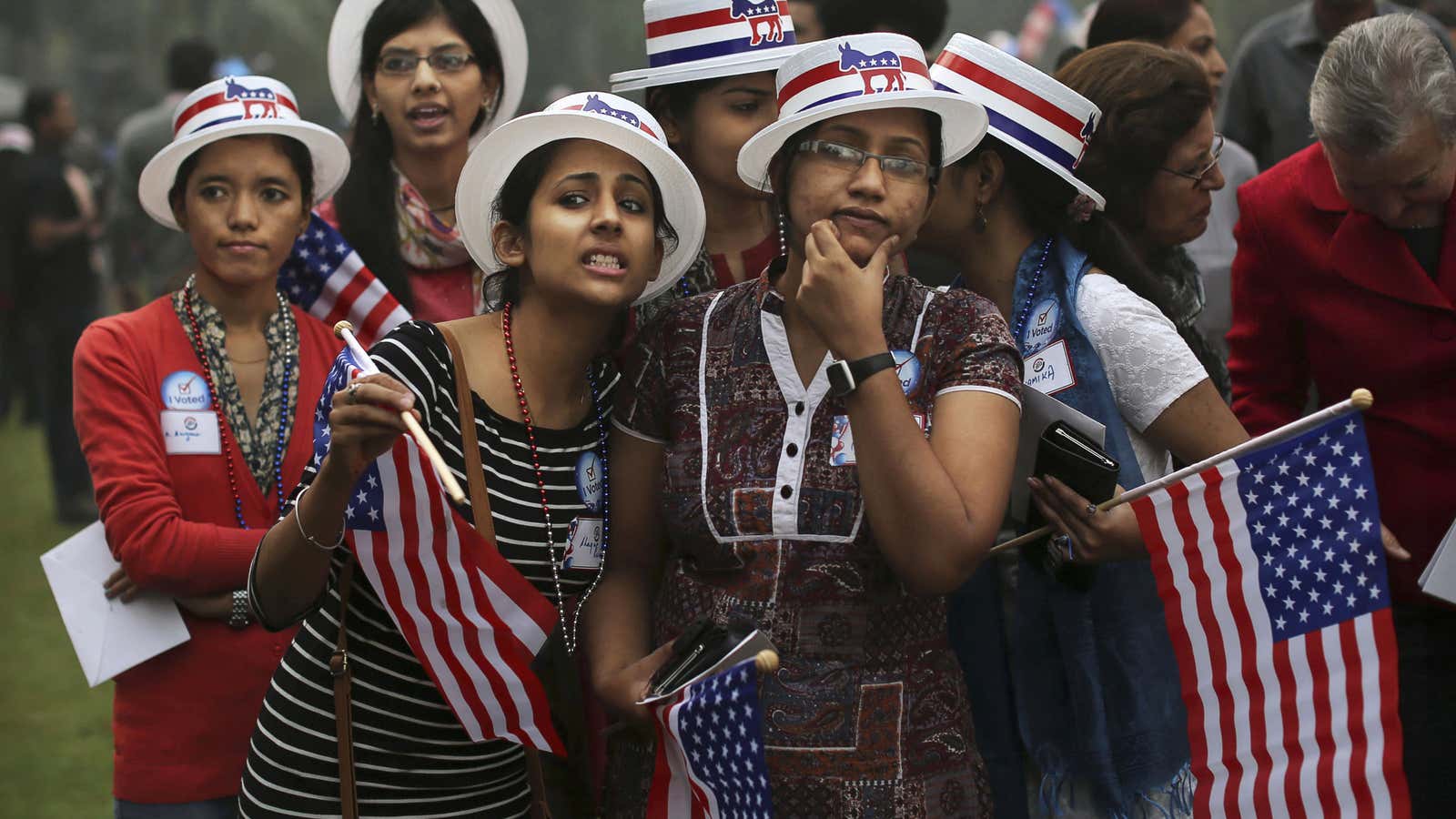America’s unofficial trade war against India might be coming to an end.
For the last few years, US consulates across India have excessively scrutinized visa applicants in the H-1B and L categories. These refer to highly skilled professional workers and inter-company transfers, respectively, who can work on temporary visas subject to renewal for a maximum of five to seven years. But last week, the US Embassy in India announced that interviews for H-1B and L visa renewals can be waived. This will not affect first time H and L visa applicants.
This appears to be more than a bureaucratic decision. Hundreds of thousands of H-1B visa holders live and work in the US, with the largest number from India, and China a distant second. Horror stories abound about questions and delays during the visa renewal process, resulting in months-long waits for Indian workers to return to their desks in Silicon Valley or Wall Street, their cubicles in Omaha and lab benches in Philadelphia. Some have lost jobs in the process, and not been able to get back onto US shores. Others have been spooked about travel altogether, and forgone overseas vacations or even trips home to India to see family or ailing relatives.
Here’s why: Since 2010, US immigration authorities have attacked the Indian information-technology consulting business model, pejoratively referred to as body or job shops, which requires an employer to place a computer professional at a third-party client site. The US Citizenship and Immigration Service (USCIS) has questioned whether the IT consulting company, which sponsors the H-1B petition, is the true employer or whether it is actually the third-party client. This was never questioned before since the IT consulting company has always paid the worker’s salary. (US law assumes that the H1-B visa holder may be placed at a client site as long as the employer posts a notification at the client, along with the salary details, and inviting US workers to file a complaint if they believe that there is any undercutting of the wage.) While there may be a few cases of fraud, this IT model has been readily embraced by US companies, which has led to a reduction in costs, efficiencies and enhanced competitiveness.
The US consulates in India quickly caught on to this tendency by the USCIS to scrutinize IT consulting companies, and also began asking questions about the employer-employee relationship even after USCIS had approved the visa application. This scrutiny extended to even well-established US companies with operations in India. Many H-1B visa applicants are routinely questioned regarding the size of the company and asked to produce a roster of all the company’s employees.
It remains to be seen whether the expanded interview waiver program (IWP) will improve the processing of H-1B and L visa applications. For more than two years, US consulates in India have routinely held up the processing of H and L visa renewal applications. Many of these applications are given a very close look even after the H-1B or L visa petition has been approved by the USCIS, and that too after the petitioner overcame objections prior to approval. The visa applicant is often requested to provide further proof of the bona fides of the job opportunity or the petitioning company. This is done mainly for visa applicants who are employees of IT consulting companies. Even if the visa applicant is able to overcome any suspicions about the employer or the bona fides of the job opportunity at the US consulate, it could take several months before the visa is re-issued and this delay could cause extreme hardship to the applicant, including the loss of the job. People who travelled unwittingly on a vacation to India, hoping to quickly apply for a renewal H-1B or L visa, were met with a rude shock when their application was questioned and delayed for several months. Some have not been able to return back to the US.
This is leading to an abundance of caution: many beneficiaries of H-1B and L petitions have not traveled outside the US, even if elderly parents die. First time H-1B and L visa applicants may still be subjected to a vigorous re-adjudication of their petitions, but it is hoped that the expansion of the interview waiver to H-1B and L applicants will eliminate further delays these re-adjudications are causing. If every H-1B or L renewal applicant is subject to the same vigorous scrutiny as before then it would defeat the objective of the expansion of the waiver.
While the interview waiver is a positive signal, it is too soon to tell whether this represents a change in the mindset of the immigration authorities who seem to think Indian IT consulting companies displace US workers, especially after the economic downturn in 2008. An attack on this business model, which provides flexibility and reliability to US companies at affordable prices that benefits consumers and drives further innovation, will deprive the US of further job creation and growth. Once this is realized, it is hoped that the unofficial trade war will be called off.
A version of this piece first ran on Cyrus Mehta’s blog.You can follow him on Twitter at @cyrusmehta. We welcome your comments at ideas@qz.com.
